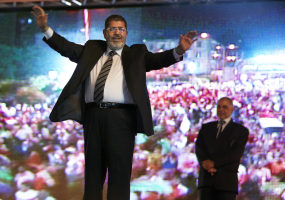There is
still life in an Arab Spring that started with great expectations over 19
months ago and that has had many ups downs as it moved from one country to
another and even from one continent to another. The great hopes of the Arab
masses got a great lift that their long term sufferings under illegitimate
regimes and totalitarian rule is coming to an end when Mohammad Bouazizi set
himself on fire on December 17, 2010 in Tunis. That act of immolation set the
Arab street on fire.
In no time
the Tunisian strong man, Zine el Abidine Bin Ali was forced to flee the country
to Saudi Arabia. This was followed by the daily demonstrations in Tahrir square
of Cairo which also saw Hosni Moubarak leave office in disgrace. The Yemeni uprising ended in an arrangement
that replaced the ousted president, Ali Abdallah Saleh, with his Vice president
and the promise of major reforms. Bahrain on the other hand saw major peaceful demonstrations
that have been put down by brute force of the government at the urgings and
military support of Saudi Arabia.
Muammar Qadaffi’s 40 year rule ended ignominiously with the aid of a
NATO bombing campaign authorized by the UN Security Council and requested by
the Arab League. The Syrian killing
fields however are still going on and even gaining in their intensities.
The success
or failure of events and developments is never simple and straight forward to
assess since different perspectives and visions play a major role in colouring
such evaluations. It is not uncommon to discuss in academic circles whether the
American and French revolutions have succeeded or whether they were even revolutions.
It is not the aim of this rather short piece to delve into this very
complicated and multifaceted issue of whether the Arab Spring has been a true
revolution or whether it has succeeded in at least setting the Arab states on
the path to political integrity and democracy. Suffice it to say that if political
revolutions are to be understood as a process that leads to fundamental change
in the basis upon which society is built and in a relatively short time then
the Arab Spring has set up that spark in motion with varying degrees of
success.
The announcement
earlier today that Mr. Morsi is the next Egyptian president is a very hopeful
development. It might be true that the Egyptian military has set itself up as
the final arbiter of what changes are to be made in the Egyptian political
establishment but the mere fact that a card carrying member of the Moslem
Brotherhood has been elected to the office of the presidency has prevented to
counter revolutionary forces of the former PM, Chafic, from setting the
relative advances won by the demonstrators back. The MB deserves to be given the chance to
establish a new Egypt on democratic principles. After all, Tariq Ramada, the
grandson of Hassan Al Banna, has been writing and lecturing for over a decade
that the MB has evolved in its thinking to the point where it is a strong
supporter of democratic processes. It is worth noting that Mr. Ramada has often
denounced Wahabism as idolatrous and as a disease that poisons the mind. To him
Islam is compatible with democracy and modernity and he favours a structure of
governance similar to that of modern Turkey rather than Saudi Arabia. Moslem
Brotherhood has finally won the chance that it has sought for decades, the
chance to rule. Let us hope that they prove worthy of the trust of the Egyptian
people and that they deliver on their promises of fair, just modern democratic
and tolerant government. If they do that then the momentous occasion of having
Mohammad Morsi become the first
popularly elected president after the ouster of Hosni Moubarak could prove to
be a major revolutionary event whose ripples would be felt in Syria and then
ultimately in the GCC. A real, genuine and far reaching Arab Spring must bring
about legitimate democratic governments all throughout the Arab world. That
includes not only Syria but the GCC and the rest of North Africa. As much as
there is to celebrate as a result of the last 19 months of political change in
the Arab World I shall resist uncorking the bubbly until the winds of change
become established across MENA.





No comments:
Post a Comment